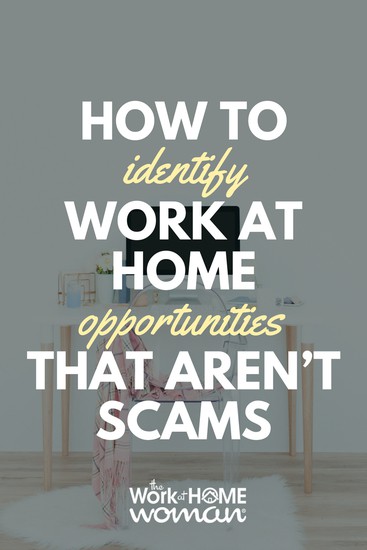If this is your first foray into exploring work-at-home opportunities, it can be a little bit daunting. How do you decipher between what’s legit and what’s a scam? Where do you even start to look for jobs? (Hint: you’ve come to the right place.) Today’s post is focused on sharing some answers to these questions as you get started on your remote job search.
First, see the scams.
No one wants to be taken advantage of, especially when you’re searching for an income producing opportunity.
Here are a few tried and true signs that a work-at-home opportunity isn’t legit:
 Scam Scenario 1: Opportunities Where You Have to PAY to Work
Scam Scenario 1: Opportunities Where You Have to PAY to Work
The whole point is to find something that will help supplement your income, not theirs. So, if you find a job that sounds appealing, but, they want your credit card number or a small minimum investment, RUN FOR THE HILLS. In most cases, it is probably a scam. There are a few exceptions to this rule, and you can read about them here.
Scam Scenario 2: Asking for Confidential Information
If a job opportunity is asking for your private banking information, credit cards, or other information that would make you vulnerable to identity theft or worse, it is probably not a safe bet. Unscrupulous people will use fake job opportunities to try to gather this information from unsuspecting job seekers, so, don’t fall for the trap.
Scam Scenario 3: Communication Seems Off
It is not out of the ordinary to begin a conversation with a recruiter or hiring manager via email. But early into the hiring process, you should have an opportunity to speak with them via phone or video conference. If they insist on only talking via email or direct message, something is probably fishy.
Speaking of email, look at their email address. If they are using a Gmail, Yahoo, or a bastardized version of a company email address, you definitely want to proceed with caution. The bottom line is a good recruiter will try to establish a more personal, verbal connection with you as soon as possible.
You can also do a quick company review search on sites like the Better Business Bureau, Glassdoor, Ripoff Report, and LinkedIn — these sites can give you a wealth of information about a company’s practices and work ethics.
Scam Scenario 4: Follow Your Instincts
If something seems too good to be true, it just might be. If your gut instincts tell you that something is wrong, take a minute to research the opportunity online, contact the organization to confirm the positions are open and do the extra legwork to save yourself from a potentially damaging situation.
One way to confirm that a recruiter or opportunity is legit is to call the organization and ask for the person you are dialoguing with. If they are really affiliated with the company and they are really hiring for a given position, it should be relatively easy to confirm.
How to Find Work-at-Home Opportunities That Aren’t Scams
Now that we have covered some of the “don’ts” let’s talk about some of the dos. Doing a simple search on the Internet for remote jobs will bring back an incredible array of results, some solid, and some that are better to avoid.
Here are a few simple first steps that will get you on your way to finding a work-at-home opportunity that isn’t a scam.
1. Check out The Work at Home Woman
There are loads of articles with links to legitimate work-from-home opportunities for almost any and every interest under the sun. A few to start with include:
- 15 Work From Home Jobs You’ll Actually Want to Apply For
- 20 Work-at-Home Companies with an A+ Rating on the BBB website
- 100 Work-at-Home Jobs and Opportunities for Moms
2. Consider On-Demand Work Opportunities
If you are looking for a little extra money on the side or work you can do on your own terms, on-demand work opportunities may be for you. Opportunities range from being a delivery driver DoorDash to dog walking or pet sitting via communities like Rover, or personal care opportunities (like child care, private tutoring or lessons, errands, and odd jobs, housekeeping, and more) on sites like Care.com.
For more on-demand opportunities, check out these posts:
3. Freelancing
If you are a talented writer, graphic designer, tutor, or are an ace with Excel reports and general business support, consider offering your assistance via sites like Freelancer, Upwork, or Guru.
Here are a couple of helpful articles to get you on your way with freelancing:
4. Search Telecommuting Roles with Your Favorite Companies
Maybe you want to work in a more traditional, 9-to-5 role, but you are just interested in doing it from your home. Make a list of target companies you are interested in exploring, go to their careers websites, and search for telecommuting or remote opportunities. Most of the Fortune 100 companies have remote opportunities available in a myriad of disciplines.
Need more direction? Check out these articles for guidance:
- How to Find Your First Work from Home Job on LinkedIn
- 8 Places to Find Work-at-Home Opportunities in Your Own Town
Conclusion.
With a little common sense and research, you can find a work-from-home opportunity that fits your lifestyle and needs!
How do you identify work-at-home opportunities that aren’t scams? What other work-at-home jobs do you recommend? Drop us a note; we’d love to hear from you!








Hello , I don’t know if this really or not. But I would like to get a job that , I can work from home like making jewelry or any crafts. That if they send all the things to make them..I tray every web site out there and there scam.. I have to stay home because my bad health. I just need something to do..
I’m a Bsc graduate,because of financial problems and my health condition I like to work from home jobs, to earn some thing for my family. I can do science and zoology practical record works
Happy Saturday Holly,
I tend to perform independent research before I join an affiliate network. If I’m looking to partner with a reputable network, I want to know how long they’ve been in business, their search engine rankings, which specif advertisers are on that work from home affiliate network, in addition to how long those particular advertisers been on that affiliate marketing network. This is part how many ways I make a determination if that specific work from home affiliate network is worth partnering with and if I write a review in referring others. Thank you for a thought-provoking post. :-)
How can you say in Scam Scenario 3 that using a Yahoo or Gmail account makes you want to proceed with caution? Millions of self-employed/entreprenuers use Yahoo and Gmail as their primary business email as both emails offer a basic and business paying account. It DOES NOT make you a work at home scam in any form whatsoever.
That is true, some entrepreneurs do use free email accounts. BUT with that being said, the majority of people that are promoting scams, use free email accounts to hide behind. It’s just something to be aware of — and if you want to look more professional as a business owner, I suggest getting a website and using an email address that corresponds with your website.